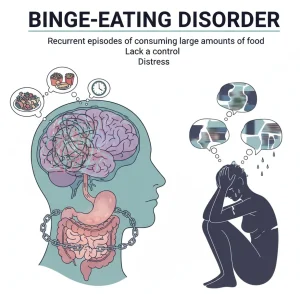Overview
Diagnosis
Diagnosing binge-eating disorder typically begins with a comprehensive mental health evaluation. During this assessment, a mental health professional discusses your eating habits, emotions, and behaviors to understand your relationship with food. It’s important to seek a professional experienced in diagnosing and treating eating disorders.
In addition to the psychological evaluation, your healthcare provider may recommend medical tests to detect conditions that often occur with binge-eating disorder. These may include high blood pressure, high cholesterol, heart disease, diabetes, gastroesophageal reflux disease (GERD), poor nutrition, electrolyte imbalance, or sleep-related breathing issues.
Common diagnostic procedures may include:
A physical examination. This may include checking your weight and vital signs.
Blood and urine tests. These help assess metabolic health and identify possible complications.
A consultation with a sleep specialist. This is often recommended if sleep disorders, such as sleep apnea, are suspected.
Treatment
The primary goal of treating binge-eating disorder is to establish healthy and consistent eating patterns. Treatment also focuses on addressing emotional challenges such as guilt, shame, anxiety, and depression that often accompany the disorder. By learning to manage emotions and eating behaviors, long-term recovery becomes possible.
Treatment is usually provided by a multidisciplinary team that may include physicians, psychologists, psychiatrists, and dietitians — all experienced in eating disorder care.
Talk Therapy
Talk therapy, also known as psychotherapy, is one of the most effective approaches for treating binge-eating disorder. It helps individuals recognize emotional triggers, replace harmful eating behaviors with healthier ones, and develop coping strategies. Therapy may be conducted individually or in group settings.
Common types of therapy include:
Cognitive Behavioral Therapy (CBT). This therapy focuses on identifying negative thoughts and emotions that lead to binge eating. It helps develop self-control and promotes healthier eating habits. Enhanced CBT (CBT-E) is a specialized form of CBT tailored specifically for eating disorders.
Integrative Cognitive-Affective Therapy (ICAT). ICAT helps individuals understand and manage the emotions that trigger binge-eating behaviors. It is particularly effective in adults.
Dialectical Behavior Therapy (DBT). DBT teaches emotional regulation, stress management, and interpersonal skills. These strategies help reduce emotional distress and the urge to binge eat.
Medications
Certain medications can assist in managing symptoms of binge-eating disorder. The first medication approved by the U.S. Food and Drug Administration (FDA) for treating moderate to severe binge-eating disorder in adults is lisdexamfetamine dimesylate (Vyvanse). Originally used for attention-deficit/hyperactivity disorder (ADHD), it helps reduce binge-eating episodes. However, as a stimulant, it carries a risk of dependence and may cause side effects such as dry mouth, insomnia, or more serious reactions in rare cases.
Other medications sometimes prescribed include specific antidepressants and seizure-control drugs, which may help reduce binge urges and stabilize mood. Medication should always be used under the supervision of a qualified healthcare professional.
Advertisement

